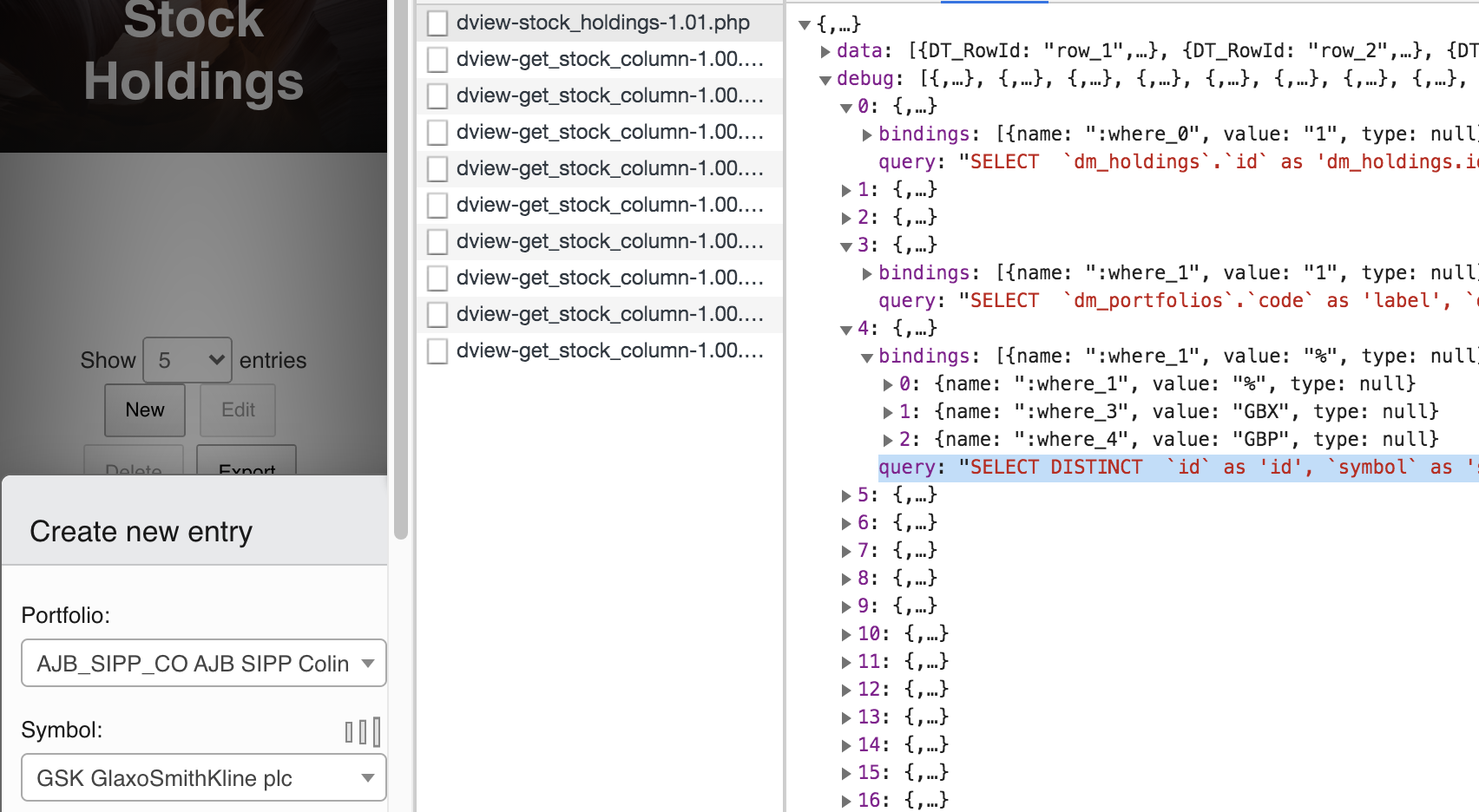combining $search and $userid in where clause in server file
combining $search and $userid in where clause in server file
Link to test case:
Debugger code (debug.datatables.net):
Error messages shown:
Description of problem:
Hi, I am trying to combine some conditions in my server file using the ->where construct as follows
this extract (1/2) of my server file extracts only stocks with a currency code of GBX or GBP successfully
,Field::inst( 'dm_holdings.stock_id' )
->options( Options::inst()
->table( 'dm_stocks' )
->value( 'id' )
->label( array('symbol', 'name') )
->where( function ( $q ) use ( $search ) {
$q
->where('dm_stocks.symbol', $search, 'LIKE' )
->and_where( function ( $r ) {
$r->where('dm_stocks.currency','GBX');
$r->or_where('dm_stocks.currency','GBP');
});
this extract (2/2) only selects portfolios.code where the user_id is equal to the current logged in user given by $userid
,Field::inst( 'dm_portfolios.code' )
->searchPaneOptions( SearchPaneOptions::inst()
->value( 'dm_portfolios.code')
->label( 'dm_portfolios.code' )
->leftJoin( 'dm_portfolios', 'dm_portfolios.id', '=', 'dm_holdings.portfolio_id' )
->where( function ( $q ) use ( $userid) {
$q
->where( 'dm_holdings.user_id', $userid );
} )
)
I need to add 2 conditions for $userid condition to extract (1/2) code along the lines of
->where( function ( $q ) use ( $userid) {
$q
->where( 'dm_stocks.user_id', $userid )
->or_where( 'dm_stocks.user_id', '0' );
});
My question is how do I integrate the above code into extract (1/2) of my server file, I have tried but failed to understand how to combine the $search and $userid conditions.
Assuming you have access to my system (Pm'd previously) the files are
to demonstrate the problem
https://www.dividendview.co.uk/stock-holdings/
client file, should not be required, let me know if you require it
server file
/home/ukincome/public_html/Editor-PHP-1.9.6/controllers/dview-stock_holdings-1.01.php
Many Thanks
Colin
This question has accepted answers - jump to:
Answers
Hi Colin,
Just to clarify - are you asking how to add the currency WHERE condition to the SearchPane options? Can you show me the WHERE condition you are trying to build in SQL please?
Allan
Hi Allan
I need to restrict the stocks in the selection to dm_stocks.user_id = 0 (available to all users i.e. standard stocks, 99.9% of defined stocks) and dm_stocks.user_id = $userid (user specific stocks only defined and available to logged in user)
So if user_id = 2 for logged in user, I need selection where dm_stocks.user_id = 0 AND dm_stocks.user_id = 2
The currency extract (1/2) works, so it restricts the selection of stocks to GBX and GBP currency types. The issue is that section of code (1/2) will select all logged in users user specific stocks where dm_stocks.user_id = 0 and 1, 2, 3, ... etc
I need to know the syntax of how to integrate the user_id condition below
into extract (1/2) code below (which works), so add that condition to the currency condition for selection of standard stocks (user_id=0) and user specific stocks
webpage and server file shown above in call
client snippet
https://www.dividendview.co.uk/wp-admin/post.php?post=30366&action=edit
screen dump of debug and editor of extract (1/2) before addition of user_id code.

Many Thanks again
Colin
Hi Allan
Sorry, I should have said, it is not a searchPanes issue, thanks
Colin
Assuming I've understood correctly, then this should do what you need:
Allan
Many Thanks Allan,
I will test the above code today and let you know the results, it looks like your understanding of my problem is correct, I could not work out the nesting.
Best Colin
Hi Allan
I have added your code on a new version of the script
/home/ukincome/public_html/Editor-PHP-1.9.6/controllers/dview-stock_holdings-1.02.php and logged in as a userid = '1'
The value of $userid in line 5 must not be evaluating correctly to '1', despite holding the correct value in the code immediately above used for portfolio selection.
If I hardcode line 5 above, the select list is populated correctly
->where( 'dm_stocks.user_id', '1' )all above stocks are included in select list
If I echo $userid at the top of the script the value returned is 1, and it is used evaluating correctly in other areas of the script.
nearly there I think, any ideas ?
Thanks
Colin
Nothing obviously wrong there and no indication of what might be overwriting it.
Try adding your
echo $userid;statement just inside that anonymous function.It would be worth adding
->debug(true)before the->process()call (if you haven't already) and show me the JSON being returned from the server as well please. That will show the value that was bound.Allan
Hi Allan
Thanks for getting back, yes it is a strange one, I have added the echo statements below, results shown after, the value being reset to ''.
Here is the JSON file
http://dividendview.co.uk/datatables_call_json.txt
I had set the debugging on, it is always on until when I go live.
```
<?php > ``` ?>->debug(true)
->process($_POST)
->json();
Let me know if you need more information.
Many Thanks
Colin
Weird! Are you using
$useridanywhere else in your code? I don't see where it is being set in the above code at all.Allan
one other thing you could try, if $userid is comng from a session variable, you could try using that directly - e.g.
$_SESSION['userid'].Allan
Hi Allan
I am setting the value of userid at the top of the script, I will explore options of getting its value in another way as you have suggested, and get back to you, thanks.
The userid is used throughout my system, as certainMySQL tables such as stocks are used for all users, but other tables such as stock portfolios (ISA, SIPP etc) , stock holdings are user specific.
method 1, currently used
server
method 2
client
server
Thanks
Colin